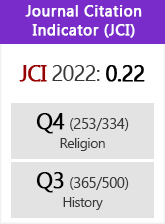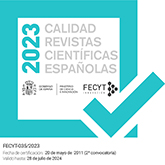La transferencia del conocimiento secreto: tres diálogos árabes de alquimia
DOI:
https://doi.org/10.3989/alqantara.2016.013Palabras clave:
Alquimia, prosa literaria árabe, diálogo (forma literaria), Jālid ibn Yazīd, Kitāb al-Ḏahab, Kitāb Mihrārīs al-ḥakīm, transferencia de conocimiento, marco literario, Masā’il Jālid li-Maryānus al-rāhib, maestro y discípulo, Risālat al-ḥakīm Qaydarūs, RoberResumen
La alquimia arabo-islámica gozó de considerable popularidad hasta los siglos XIX y XX. Puede ser considerada como una precursora de la química moderna y como una filosofía natural cuyo objetivo es explicar el mundo. Sin embargo una de las cuestiones no resueltas acerca de la alquimia es cómo se supone que debía aprenderse, puesto que se trataba de un arte que debía mantenerse en secreto y sólo podía ser relevada a unos cuantos elegidos. Mientras que los aspectos prácticos de la experiencia de aprendizaje siguen siendo oscuros, cabe destacar que, a menudo, la literatura alquímica árabe hace uso del diálogo, género literario íntimamente ligado a la enseñanza y al aprendizaje. Este trabajo se basa en tres diálogos árabes de alquimia: Masāʼil Jālid li-Maryānus al-rāhib (Preguntas de Jālid al monje Maryānus), Kitāb Mihrārīs al-ḥakīm (El libro de Mihrārīs, el sabio) y Risālat al-ḥakīm Qaydarūs (La epístola del sabio Qaydarūs). Por otro lado, y centrándonos en el marco literario de estos textos, se discutirá cómo se representa la transferencia del conocimiento secreto, su puesta en escena, la relación maestro-discípulo, y la cuestión de la interacción entre estas partes desiguales.
Descargas
Citas
Al-Hassan, Ahmad Y., "The Arabic Original of Liber de compositione alchemiae. The Epistle of Maryānus, the Hermit and Philosopher, to Prince Khālid ibn Yazīd", Arabic Sciences and Philosophy, 14 (2004), pp. 213-231. https://doi.org/10.1017/S0957423904000086
Bacchi, Eleonora and Matteo Martelli, "Il principe Ḫālid bin Yazīd e le origini dell'alchimia araba", in Daniele Cevenini and Svevo D'Onofrio (eds.), Conflitti e dissensi nell'Isl.m, Bologna, Il Ponte, 2009, ʽUyûn al-Akhbâr. Studi sul mondo islamico 3, pp. 85-120.
Belhaj, Abdessamad, Argumentation et dialectique en islam. Formes et séquences de la munāẓara, Louvain-la-Neuve, Presses universitaires de Louvain, 2010.
Berlekamp, Persis, "Painting as Persuasion: A Visual Defense of Alchemy in an Islamic Manuscript of the Mongol Period", Muqarnas, 20 (2003), pp. 35-59. https://doi.org/10.1163/22118993-90000038
Bertaina, David, Christian and Muslim Dialogues. The Religious Uses of a Literary Form in the Early Islamic Middle East, Piscataway, Gorgias Press, 2011.
Berthelot, Marcellin, Collection des anciens alchimistes grecs, Paris, Steinheil, 1887-88, 4 vols.
Berthelot, Marcellin, La chimie au moyen áge, Paris, Imprimerie nationale, 1893, 3 vols. [Reprint Osnabrück, Zeller, 1967.]
De Blois, François, Burzoy's Voyage to India and the Origin of the Book of Kalilah wa Dimnah, London, Royal Asiatic Society, 1990.
Buck, Günther, "Das Lehrgespräch", in Karlheinz Stierle and Rainer Warning (eds.), Das Gespräch, München, Fink, 1984, pp. 191-210.
Cardelle de Hartmann, Carmen, Lateinische Dialoge 1200-1400. Literaturhistorische Studie und Repertorium, Leiden, Brill, 2007, Mittellateinische Studien und Texte 37.
Daiber, Hans, "Masā'il wa-adjwiba", in Hamilton A. R. Gibb et al. (eds.), Encyclopaedia of Islam. New edition, Leiden, Brill, vol. 6 (1989), pp. 636-639.
Dolgusheva, Svetlana, Zwei arabische Dialoge über Alchemie. Das Kitāb Mihrārīs al-ḥakīm und die Masāʼil Ḫālid li-Maryānus ar-rāhib, MA thesis, Freie Universität Berlin, 2012.
Van Ess, Josef, "Disputationspraxis in der islamischen Theologie. Eine vorläufige Skizze", Revue des études islamiques, 44 (1976), pp. 23-60.
Forster, Regula, "Auf der Suche nach Gold und Gott. Alchemisten und Fromme im arabischen Mittelalter", in Almut-Barbara Renger (ed.), Meister und Schüler in Geschichte und Gegenwart. Von Religionen der Antike bis zur modernen
Esoterik, Göttingen, V&R unipress, 2012, pp. 213-229.
Forster, Regula, Das Geheimnis der Geheimnisse. Die arabischen und deutschen Fassungen des pseudo-aristotelischen 'Sirr al-asrār' / 'Secretum secretorum', Wiesbaden, Reichert, 2006, Wissensliteratur im Mittelalter 43.
Forster, Regula, "Inszenierung und Grenzen von Rationalität in philosophischen Dialogen", Wolfram-Studien, 20 (2008), pp. 229-252.
Forster, Regula, "Mittelalterliche arabischsprachige Dialoge. Eine Skizze an einem schiitischen Beispiel", Jahrbuch [Berliner Wissenschaftliche Gesellschaft] 2010, pp. 129-149. PMCid:PMC2828901
Forster, Regula, "Transmission of Knowledge through Literature: The Literary Frames of the pseudo-Aristotelian Sirr al-Asrār and Kitāb al-Tuffāḥa", Eos, 97 (2010), pp. 101-117.
Gutas, Dimitri and Kevin van Bladel, "Bayt al-Ḥikma", in Gudrun Krämer et al. (eds.), The Encyclopaedia of Islam. Three, Leiden, Brill, fasc. 2 (2009), pp. 133-137.
Hallum, Benjamin, Zosimus Arabus. The Reception of Zosimos of Panopolis in the Arabic/Islamic World, PhD thesis, University of London, 2008.
Hämeen-Anttila, Jaakko, "The essay and debate (al-risāla and al-munāẓara) ", in Roger Allen and D. S. Richards (ed.), Arabic Literature in the Post-Classical Period, Cambridge, Cambridge University Press, 2006, pp. 134-144. https://doi.org/10.1017/CHOL9780521771603.008
Heilmann, Johann Jacob, Theatrum Chemicum, praecipuos selectorum auctorum tractatus de chemiae et lapidis philosophici antiquitate, veritate, jure, praestantia, & operationibus continens [...], vol. 5, Argentorati [Strassburg], Zetzner, 1660.
Heinrichs, Wolfhart, "Rose versus Narcissus. Observations on an Arabic Literary Debate", in Gerrit Jan Reinink and Herman L. J. Vanstiphout (eds.), Dispute Poems and Dialogues in the Ancient and Mediaeval Near East. Forms and Types of Literary Debates in Semitic and Related Literatures, Leuven, Peeters, 1991, pp. 179-198. PMid:1937158
Hilsenbeck, Renate, Lehrdialog und Laienunterweisung. Der deutsche 'Lucidarius' im Kontext lateinischer Dialogtradition, PhD thesis, Eichstätt, 1990.
Hoffman, Eva R., "The Beginnings of the Illustrated Arabic Book: An Intersection between Art and Scholarship", Muqarnas, 17 (2000), pp. 37-52. https://doi.org/10.1163/22118993-90000005
Holes, Clive, "The Dispute of Coffee and Tea: A Debate-Poem from the Gulf", in J. R. Smart (ed.), Tradition and Modernity in Arabic Language and Literature, Richmond, Curzon, 1996, pp. 302-326.
Holmberg, Bo, "The Public Debate as a Literary Genre in Arabic Literature", Orientalia Suecana, 38-39 (1989-90), pp. 45-53.
Hösle, Vittorio, Der philosophische Dialog. Eine Poetik und Hermeneutik, München, Beck, 2006.
Ibn al-Muqaffaʻ, La version arabe de Kalîlah et Dimnah d'aprés le plus ancien Manuscrit arabe dat., Louis Cheikho (ed.), Beirut, Imprimerie catholique, 1905.
Ibn al-Nadīm, Kitāb al-Fihrist, Gustav Flügel (ed.), Leipzig, Vogel, 1871-72, 2 vols. [Reprint Beirut, 1964.]
Ibn al-Nadīm, Kitāb al-Fihrist, Ayman Fu'ād Sayyid (ed.), London, Mu'assasat al-Furqān li-l-Turāth al-Islāmī, 1430/2009, 4 vols.
Ibn al-Nadīm, The Fihrist of al-Nadīm. A Tenth-Century Survey of Muslim Culture, Bayard Dodge (trans), New York, Columbia University Press, 1970, 2 vols.
Jaʽfar b. Manṣūr al-Yaman, Kitāb al-ʽĀlim wa-l-ghulām/The Master and the Disciple, James W. Morris (ed. and trans.), London and New York, The Institute of Ismaili Studies, 2001.
Jacobi, Klaus (ed.), Gespräche lesen. Philosophische Dialoge im Mittelalter, Tübingen, Gunter Narr, 1999.
Kahn, Didier, "Note sur deux manuscrits du Prologue attribué à Robert de Chester", Chrysopaeia, 4 (1990-91), pp. 33-34.
Lazarus-Yafeh, Hava, Mark R. Cohen, Sasson Somekh and Sidney H. Griffith (eds.), The Majlis. Interreligious Encounters in Medieval Islam, Wiesbaden, Harrassowitz, 1999.
Leemhuis, Fred, "A Koranic Contest Poem in Sūrat aṣ-Ṣāffāt?", in Gerrit Jan Reinink and Herman L. J. Vanstiphout (eds.), Dispute Poems and Dialogues in the Ancient and Mediaeval Near East. Forms and Types of Literary Debates in Semitic and Related Literatures, Leuven, Peeters, 1991, pp. 165-177.
Lemay, Richard, "L'authenticité de la Préface de Robert de Chester à sa traduction du Morienus", Chrysopaeia, 4 (1990-91), pp. 3-32.
Meyer, Martin F. (ed.), Zur Geschichte des Dialogs. Philosophische Positionen von Sokrates bis Habermas, Darmstadt, Wissenschaftliche Buchgesellschaft, 2006.
Müller, Juliane, Zwei arabische Dialoge zur Alchemie. Die Unterredung des Aristoteles mit dem Inder Yūhīn und das Lehrgespräch der Alchemisten Qaydarūs und Mītāwus mit dem König Marqūnus. Edition, Übersetzung, Kommentar, Berlin, Klaus Schwarz, 2012.
Plato, Opera, vol. 3, Ioannes Burnet (ed.), Oxford, Oxford University Press, 1903. [Reprint Oxford, Clarendon, 1980.]
Polak, Jakob Eduard, Persien. Das Land und seine Bewohner, Leipzig, Brockhaus, 1865, 2 vols.
Ritter, Hellmut, "Philologika XIII: Arabische Handschriften in Anatolien und İstanbul (Fortsetzung)", Oriens, 3 (1950), pp. 31-107. https://doi.org/10.1163/1877837250X00039
Ruska, Julius, Turba Philosophorum. Ein Beitrag zur Geschichte der Alchemie, Berlin, Springer, 1931. [Reprint Berlin, Springer, 1970.]
Salmon, Georges, "Note sur l'alchimie à Fès", Archives marocaines, 7 (1906), pp. 451-462.
Sedley, David N., Jonathan Dancy, Jane Heal and Timothy Smiley (eds.), Philosophical dialogues. Plato, Hume, Wittgenstein, Oxford, Oxford University Press, 1995.
Sezgin, Fuat, Geschichte des arabischen Schrifttums, vol. 4: Alchimie, Chemie, Botanik, Agrikultur bis ca. 430 H, Leiden, Brill, 1971.
Soucek, Priscilla, "Solomon", in Jane Dammen McAuliffe (ed.), Encyclopaedia of the Qurʼān, Leiden, Brill, vol. 5 (2006), pp. 76-78.
Stavenhagen, Lee, A Testament of Alchemy being the revelations of Morienus, ancient adept and hermit of Jerusalem to Khalid Ibn Yazid Ibn Muʼawiyya, king of the Arabs of the divine secrets of the magisterium and accomplishment of the alchemical art. Edited and translated from the oldest manuscripts, with commentary, Hanover, N.H., University Press of New England, 1974.
Steinschneider, Moritz, Die arabischen Übersetzungen aus dem Griechischen, Leipzig, Harrassowitz, 1889-93. [Reprint Graz, Akademische Druck- und Verlagsanstalt, 1960.]
Ullmann, Manfred, Die Natur- und Geheimwissenschaften im Islam, Leiden, Brill, 1972, Handbuch des Orientalistik, 1. Abt., Erg.bd. 6, 2.
Ullmann, Manfred, "Ḫālid ibn Yazīd und die Alchemie: Eine Legende", Der Islam, 55 (1978), pp. 181-218. https://doi.org/10.1515/islm.1978.55.2.181
Ullmann, Manfred, Katalog der arabischen alchemistischen Handschriften der Chester Beatty Library. Teil I: Beschreibung der Handschriften, Wiesbaden, Harrassowitz, 1974. PMCid:PMC1776580
Vereno, Ingolf, Studien zum ältesten alchemistischen Schrifttum. Auf der Grundlage zweier erstmals edierter arabischer Hermetica, Berlin, Klaus Schwarz, 1992, Islamkundliche Untersuchungen 155.
Wagner, Ewald, Die arabische Rangstreitdichtung und ihre Einordnung in die allgemeine Literaturgeschichte, Wiesbaden, In Kommission bei Franz Steiner, 1962.
Wagner, Ewald, "Munāẓara", in Hamilton A. R. Gibb et al. (eds.), Encyclopaedia of Islam. New edition, Leiden, Brill, vol. 7 (1992), pp. 565-568.
Walker, J. and P. Fenton, "Sulaymān b. Dāwūd", in Hamilton A. R. Gibb et al. (eds.), Encyclopaedia of Islam. New edition, Leiden, Brill, vol. 9 (1997), pp. 822-824.
Descargas
Publicado
Cómo citar
Número
Sección
Licencia
Derechos de autor 2016 Consejo Superior de Investigaciones Científicas (CSIC)

Esta obra está bajo una licencia internacional Creative Commons Atribución 4.0.
© CSIC. Los originales publicados en las ediciones impresa y electrónica de esta Revista son propiedad del Consejo Superior de Investigaciones Científicas, siendo necesario citar la procedencia en cualquier reproducción parcial o total.Salvo indicación contraria, todos los contenidos de la edición electrónica se distribuyen bajo una licencia de uso y distribución “Creative Commons Reconocimiento 4.0 Internacional ” (CC BY 4.0). Puede consultar desde aquí la versión informativa y el texto legal de la licencia. Esta circunstancia ha de hacerse constar expresamente de esta forma cuando sea necesario.
No se autoriza el depósito en repositorios, páginas web personales o similares de cualquier otra versión distinta a la publicada por el editor.














